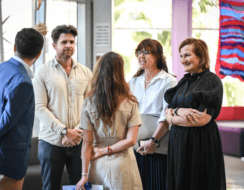17 Mar 2014
NewsMy Story – Oliver Zvinaiye Maboreke
Harmony Day, this Friday, March 21, celebrates Australia’s cultural diversity and coincides with the United Nations International Day for the Elimination of Racial Discrimination. To mark the occasion, Settlement Services International Case Manager Oliver Maboreke tells his story of arrival in Australia.
Oliver Zvinaiye Maboreke worked for two United Nations-funded organisations in his homeland of Zimbabwe at a time when the nation’s political and economic systems were collapsing.
His work with Padare and Mass Public Opinion Institute of Southern Africa as a research team leader and gender rights advocate became increasingly difficult, he said, as the government clamped down on NGOs.
“Basically, people were persecuted because we were trying to have the government recognise human rights, social equity and justice,” Mr Maboreke said.
In 2005, he was offered post-graduate scholarships to study in four different countries.
“I was offered scholarships to study in Sweden, Norway, Denmark, Australia and Russia, but I chose Australia because I am a bit of a sports person and I loved all the stories of Skippy the bush kangaroo and wildlife things,” he said with a chuckle.
“I don’t regret the decision because, actually, I think the Australian concept of ‘a fair go’ is quite feasible, but one has to work hard and get a little helping hand,” he said.
Mr Maboreke attained a Master of Social Science degree in International Project Planning and Development at Melbourne’s RMIT University.
He worked a three-month state government internship with the Department of Premier and Cabinet and moved on to a job at the Federal Department of Human Services, Centre for Culture, Ethnicity and Health.
Mr Maboreke applied for citizenship and officially became an Australian in 2009.
But his success masks the difficulties he traversed to understand Australia’s education and employment systems.
“There’s so much struggle that many migrant people go through,” he said, “even if they have good qualifications, it’s always very hard to get into meaningful employment.”
Mr Maboreke found a mentor program that he said was invaluable, through the African Think Tank – Leadership Victoria Community Leadership program.
“I had a mentor, who, over a couple of months, helped me understand the system and network, and with things like filling out selection criteria for job applications,” he said.
“So with this experience and my qualifications I gradually found good skills to break into good employment opportunities.”
Mr Maboreke is now a case manager for Settlement Services International, working with people who live in the community while seeking asylum. He is also a board member on the advocacy organisation African Think Tank.
This Harmony Day, he hopes people will reflect on how valuable multiculturalism has been for Australia.
“I think multiculturalism is important because people from different cultures have lived different experiences,” he said.
“We are all human beings and I think there is a kind of shared identity, despite colour and culture or religious differences.”


